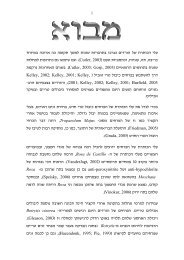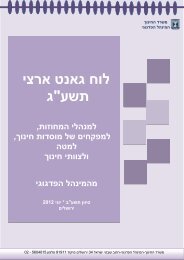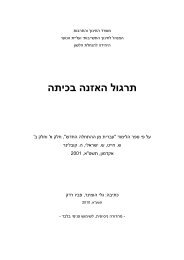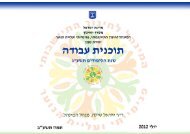The External Meitzav
The External Meitzav
The External Meitzav
Create successful ePaper yourself
Turn your PDF publications into a flip-book with our unique Google optimized e-Paper software.
<strong>The</strong> <strong>External</strong> <strong>Meitzav</strong><br />
•Monday, 4 th April 2011
<strong>The</strong> <strong>External</strong> <strong>Meitzav</strong><br />
• Why do we need it<br />
• Types of questions in the <strong>Meitzav</strong> exam<br />
• Getting ready – what to do before, during and after the<br />
exam<br />
• Dealing with pupils with LDs<br />
• Recommendations from teachers on how they deal with<br />
the <strong>Meitzav</strong> exam<br />
• Motivating your pupils<br />
• <strong>The</strong> challenges<br />
• Putting it all into perspective<br />
• Questions
Why do we need it<br />
• <strong>The</strong> <strong>Meitzav</strong> exam uses benchmarks when deciding on<br />
the different parts and types of questions – the<br />
Ministry wants to know that teachers are teaching<br />
according to the curriculum.<br />
• <strong>The</strong> <strong>Meitzav</strong> exam gives invaluable feedback to the<br />
Ministry of Education showing how the curriculum is<br />
being implemented in the field.<br />
• <strong>The</strong> <strong>Meitzav</strong> exam should be viewed as a learning tool<br />
– when the school gets the results the English team<br />
MUST analyze the performance of their pupils and<br />
implement changes.
Types of questions in the <strong>Meitzav</strong><br />
Exam<br />
• Up until now three types of questions have<br />
been used in the in the exercises for Access to<br />
Information from Spoken texts (AIS) and<br />
Access to Information from Written texts<br />
(AIW).<br />
• Literal<br />
• Integration<br />
• Inference<br />
New for 2011<br />
• Personal Response
Definitions<br />
• Literal Comprehension refers to an understanding<br />
of the explicit meaning of a text. <strong>The</strong>se questions can<br />
be answered directly from the text at the sentence<br />
level. <strong>The</strong>se are questions that can require either<br />
copying or rephrasing of information from the text.<br />
• What Who Where When Do you know Can you<br />
identify Etc.
Intergration and Inference<br />
• Integration Comprehension - refers to an understanding<br />
of the explicit meaning of a text but also requires accessing<br />
information from various parts of the text in order to<br />
answer a given question. For example; questions that<br />
require thinking about how ideas or information in the text<br />
relate to each other.<br />
• Inference Comprehension refers to an understanding of<br />
the implicit meaning of a text.<br />
For example; questions that involve combining the pupils’<br />
literal understanding of the text with their own knowledge<br />
and experiences producing a response which is not<br />
explicitly stated.
Personal Response<br />
• Personal Response refers to questions that call for<br />
pupils’ personal involvement with the text.<br />
• <strong>The</strong> answers come from the pupils and are not found<br />
in the text. However, the answers must relate to the<br />
text.<br />
• In order to answer these questions pupils have to draw<br />
on both their literal understanding of the text and<br />
their own knowledge and opinions.
Monday 4 th April, 2011<br />
What you need to do:<br />
• Make sure the pupils know which classrooms to go to.<br />
Lists on the doors help to avoid confusion.<br />
• Arrange tape players for each of the classrooms.<br />
• Organize English teachers for the reading class,<br />
preferably, the same teachers who did the mock exam.
Before the exam.<br />
Getting Ready<br />
No dictionaries – so you must practice:<br />
• Vocabulary – extensive reading is essential to improve<br />
your pupils’ vocabulary.<br />
• Reading a variety of texts without dictionaries<br />
• Word order in sentences<br />
• Parts of speech<br />
• Guessing words in context
Access to Information from<br />
• Practice listening activities.<br />
Spoken Texts (AIS)<br />
• Use old <strong>Meitzav</strong> exams for practice.<br />
• Make sure pupils read the questions and mark<br />
important words before the listening task.<br />
• Tell pupils to listen to the first broadcast without<br />
marking answers
Access to Information from Written<br />
Teach strategies:<br />
• Marking the texts<br />
Texts (AIW)<br />
• Finding key words in the questions<br />
• Looking for definitions of unknown words – maybe<br />
italicized e.g. pide – a type of pizza<br />
• Headings and sub-headings<br />
• Example: April 2010
Written Presentation<br />
<strong>The</strong> writing is assessed according to<br />
• Communicative Ability 0 – 9 points<br />
• Accuracy 0 – 9 points<br />
• Length 0 – 2 points<br />
You must work on:<br />
• Sentence structure<br />
• Capital letters and punctuation<br />
• Vocabulary and spelling<br />
• Text structure
What to do Before, During and<br />
Before<br />
After the Exam<br />
• Send a letter explaining to parents about the exam<br />
• Do at least ONE mock exam in exactly the same way<br />
that they will take the actual exam<br />
• Use old exams as worksheets explaining to the pupils<br />
how to look for the answers<br />
• Make sure the teachers have seen the Table of<br />
Specifications.
• Stay out of the way!!<br />
During the Exam<br />
• English teachers should not be around while the<br />
proctors are watching over the exam.
After the Exam<br />
• <strong>The</strong> exam results take about 8 months to come<br />
through so relax and wait.<br />
Analyze the results:<br />
• Check strengths and weaknesses<br />
• Each question is analyzed so look at the types of<br />
questions that caused problems<br />
• Reevaluate how you teach – the same techniques are<br />
needed throughout high school.
Pupils with LDs<br />
• <strong>The</strong> school counselor should have filled in a form with<br />
the names of the pupils who need to be in the ‘reading<br />
class.’ This includes pupils who during the year have<br />
been tested orally, with discs<br />
• You must practice with these pupils at least once – the<br />
mock exam – and if possible even more, before the<br />
exam<br />
• Use the same teachers to read in the mock exam as in<br />
the real <strong>Meitzav</strong> exam<br />
• All of the pupils are entitled to an extra 15 minutes
Teachers’ Recommendations<br />
• Build comprehension skills<br />
• Practice listening and writing skills all the time – not<br />
just for the exam<br />
• Work on vocabulary acquisition<br />
• Encourage reading, reading and more reading<br />
• Teach reading strategies – identification of text types,<br />
etc.<br />
• Have department meetings to discuss the exam<br />
• Encourage ALL of the pupils to come to school on the<br />
day of the exam
Motivating your Pupils<br />
• Encourage your pupils to do their best for their own<br />
pride and the pride of the school
• <strong>The</strong> length of the exam<br />
<strong>The</strong> Challenges<br />
• Getting the pupils to take it seriously<br />
• Meeting with the principal’s expectations<br />
• <strong>The</strong> level of the reading material<br />
• <strong>The</strong> weaker pupils – getting them ready, motivated and<br />
helping them to feel good about themselves after the<br />
exam<br />
• Working without dictionaries
Putting it All into Perspective<br />
• All of the approved textbooks teach according to the<br />
benchmarks, so if you use a textbook then you are<br />
already teaching towards the <strong>Meitzav</strong> exam<br />
• Keep your pupils calm: If you don’t get stressed out by<br />
the exam, neither will they<br />
• Learn from it: <strong>The</strong> booklet that explains the questions<br />
and answers is an invaluable tool
Thank you for listening.<br />
If you have any further questions:<br />
Diane VanSpier<br />
Phone: 050 -7468149

















